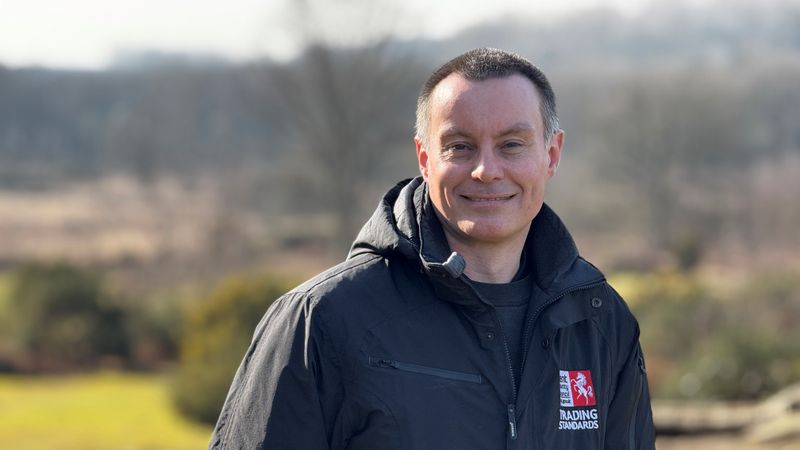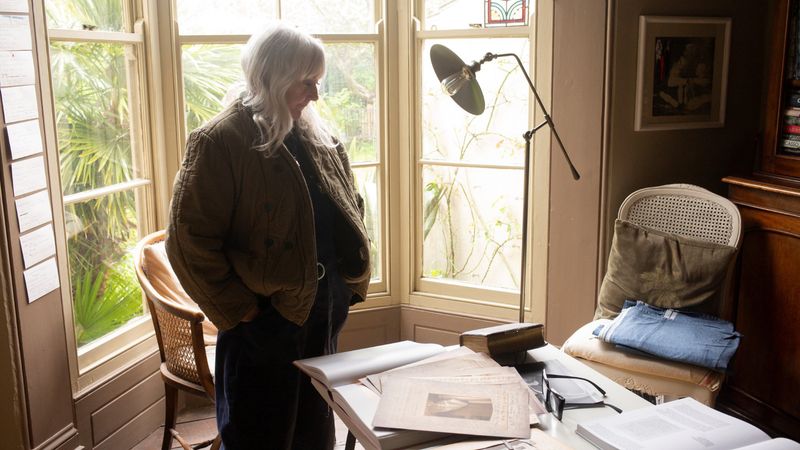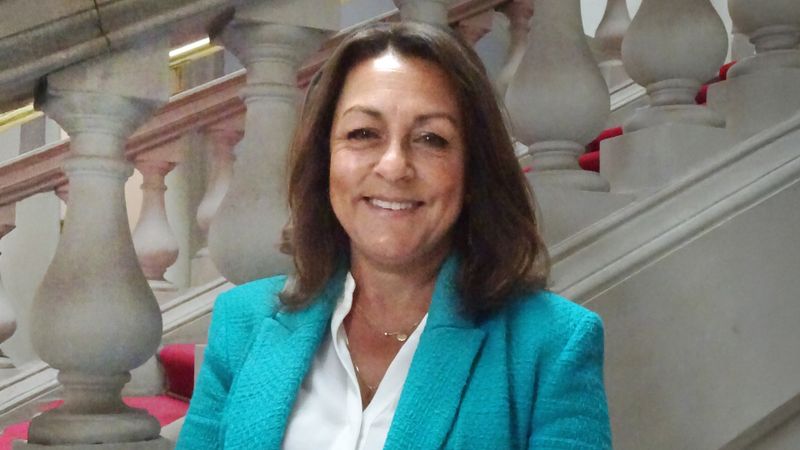Supporting farmers whose flocks and herds have suffered a dog attack is just one of the parts of the job of the Animal Health Team at KTS, a small unit which punches above its weight in terms of making a difference.
We went for a walk in the glorious Kent countryside near Ashford with team member Kieron Watts to find out more.
Kieron Watts is made of tough stuff. Before joining Kent Trading Standards, he was a detective so has seen some things in his time.
But his first day in the new job as an animal health officer was going to make or break him. He was sent to an abandoned abattoir, where the offcuts from the last shift had not been cleared away. The lights, and refrigeration units, were turned off two years earlier.
He said: “I’ve never smelt anything like it, and I’d been out to a lot of things in the police that were pretty grim.”
Thankfully it is not all entrails and sludge (although he’s also got a decent knowledge of the restrictions on muck spreading on farmland after three years, so feel free to inquire).
Kieron did not have any agricultural experience when he came into the role so the learning curve was steep, but he soon found it is about building relationships, finding solutions and offering the right support at the right time. With somewhere in the region of 5,000 farms in Kent, and half of these managing livestock, there are plenty of conversations to be had and issues to tackle.
He said: “There’s so much to learn, but that’s what makes it so interesting.
“You do an animal health and welfare course for starters, where you get across the legislation. I've not come from any kind of farming background so there was a lot to embrace in the first year or two, understanding animal diseases and sheep and cattle behaviour. Then when we get something that's out of the ordinary, we read and research around it to know the best route to a resolution. You never know what’s coming next!”
One constant in the diary is livestock market day in Ashford on a Tuesday. There, Kieron and his colleagues will be inspecting the welfare of animals in transport, their condition once they arrive in the pens, checking they are healthy and not suffering from any diseases nor lame and monitoring their tagging to make sure there is traceability in the food chain.
He said: “We are ensuring that animals that come into the market are fit to be sold and also correctly identified, so that when they go onto their next farm or to the slaughterhouse, they can be traced back to their home holding.
“It’s also an opportunity to engage with farmers. A lot of them are very used to spending up to 15 hours a day on their own, which can make cracking something of an insular community quite challenging, especially as outsiders and official figures can be treated warily. When I first started, some would clock me and walk in the other direction. It’s taken time but they feel comfortable coming to us with questions now and we can offer advice and guidance. That’s a real positive.
“It’s been about demonstrating Trading Standards are not all about enforcement and prosecution from the off. First and foremost, we’re here to help them to compliance and steer people in the right direction.”
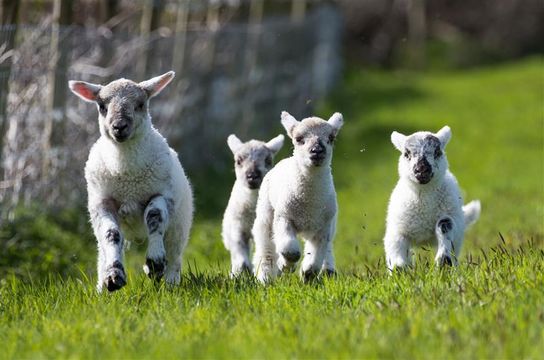
If livestock is in the vicinity, please put your dog on its lead
The range of problems the team might be looking at are the dog attacks, suspected poor animal husbandry, the quality of feed or concerns for the deteriorating mental health of someone in the rural community. A recent survey by the Farm Safety Foundation charity showed the pressures being faced in the industry have led to risk-taking behaviours, accidents, and worse.
In the sample of over 750 farmers, nine out of 10 respondents (91%) agreed that poor mental health is the 'biggest hidden problem' facing farming today. The Office for National Statistics’ death registration data shows 117 farmers died by suicide between 2022 and 2023.
Kieron said: “We act as a gateway and can signpost to other services that will be able to help and support, like the Farming Community Network charity with whom we work closely. There might be a reason why someone is not looking after their animals very well - illness, a bereavement, they’ve taken on too much work, they are struggling with technology or administration, there’s a lack of knowledge.
“We’re part of a network of agencies, groups and organisations that overlap, have developed strong connections and communication routes to reach out to these isolated communities to help and the quicker we intervene, the better the outcome.”
An enviable part of the job is getting out into the spectacular scenery to follow up on these leads. Sometimes members of the public report seeing dead animals in a field, but often all’s well that ends well, and it serves as another opportunity to get a foot in the barn door.
He said: “Of course it happens and a farmer must remove a carcass within a certain timeframe. Usually, there is no bad practice and the livestock might simply be sleeping in the sunshine, and get a bit of a fright when we go and investigate!
“We walked across a field once and we could see three or four sheep and they did look dead, they were laying on the side really kind of limp and we were thinking this was looking bad. We got within about a foot of this sheep and it suddenly woke up and ran. You could see why members of the public thought as they did. I appreciate the reports as people are concerned about animal welfare and I want them to keep coming as they always trigger contact and conversations. We might not have come across the farmer before and we can then build up a bit of a rapport and hopefully we leave and they've had a positive experience.”
Farmers have been in the media, descending on Downing Street to protest at changes to inheritance tax proposed by Central Government.
Kieron added: “What we see when we go onto farms are people working seven days a week, 365 days a year and they have done that for two, three, four generations.
“The cost of living pressures are there. We do see people who are just about scraping a living with crazily slim margins doing their best to produce our food to the highest quality they can.”
In addition, the team deals with the illegal import of dogs and cats. What they are seeing at the border at Dover and Folkestone are a lot of animals that are purportedly rescued from the streets of eastern Europe. Sometimes all is not as it seems.
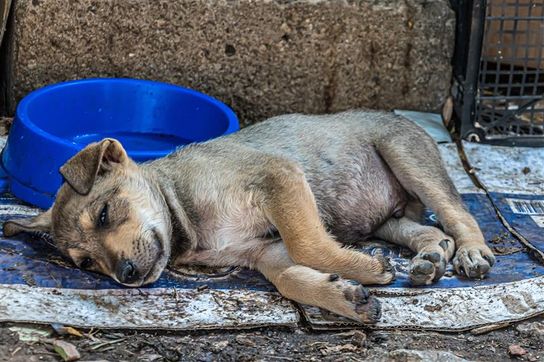
Be careful when tempted by social media posts about rescue puppies and dogs
There appears to be an intention to undercut the British rescue market, which has strict rehoming rules, fuelled by AI-created videos on fake Facebook sites that pull on the heartstrings of unsuspecting animals lovers on this side of the channel with sad stories.
Kieron said: “We suspect there are probably puppy farms abroad that masquerade as rescue charities. They say they have saved dogs off the streets of Romania or Russia or Belarus and then advertise to people in the UK for a happy forever home. But there’s nothing to suggest that these are genuine rescue dogs. It seems they have most probably been puppy farmed in pretty horrendous conditions, and they're transported in a horrible state, in small cages with soiled puppy pads, injuries not attended to, not fed, some removed from their mothers too soon.”
Once they arrive in the UK, it’s the new owner’s responsibility, which can mean a bill for thousands of pounds for quarantine and rabies vaccinations and treatments. The drivers don’t care. They disappear and the charities leave ghost trails.
Kieron added: “Some of the ones you see are awful. We had a case recently where the dog had lost most of its hind leg through an amputation, but it had actually chewed its own leg down to the bone where it was so hungry during the journey. That was heartbreaking.”
Have his trips to abattoirs and the like led him to go meat free? No, but he approaches his work as an animal champion.
Kieron added: “They don’t have a voice and even as a meat eater, I want these animals that are sentient beings to have a very good standard and quality of life. We owe them in that respect.”
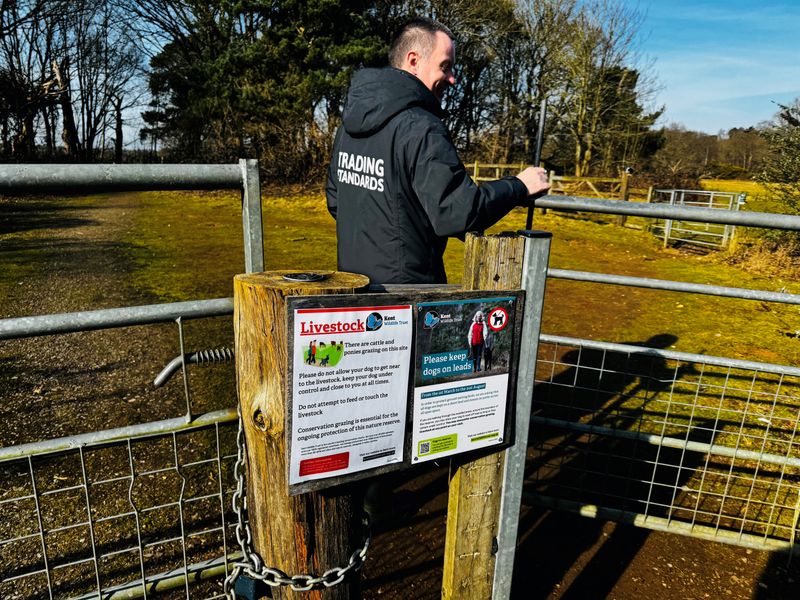
The signage at Kent Wildlife Trust sites
Further information
As farms open their gates and welcome families during half term and the weather encourages people to get out on a countryside walk, Kieron has a warning:
“If you see the signs that say farm animals are in the area, then that's the time to get control and walk your dog through on the lead.
“Anything else creates a very unpredictable situation and is a reckless act. Scared livestock wanting to escape what they are viewing as a predator will take flight and they'll all run together and could cause a lot of damage, to themselves or to you and your family. A dog might not be able to resist its instincts at this point. An incident like this could lead to prosecution and compensation. It’s a terrible situation that is so easily avoided.”
Kieron was at the Kent Wildlife Trust at Hothfield. Read about taking your dogs to its sites here: Dogs on our reserves | Kent Wildlife Trust
